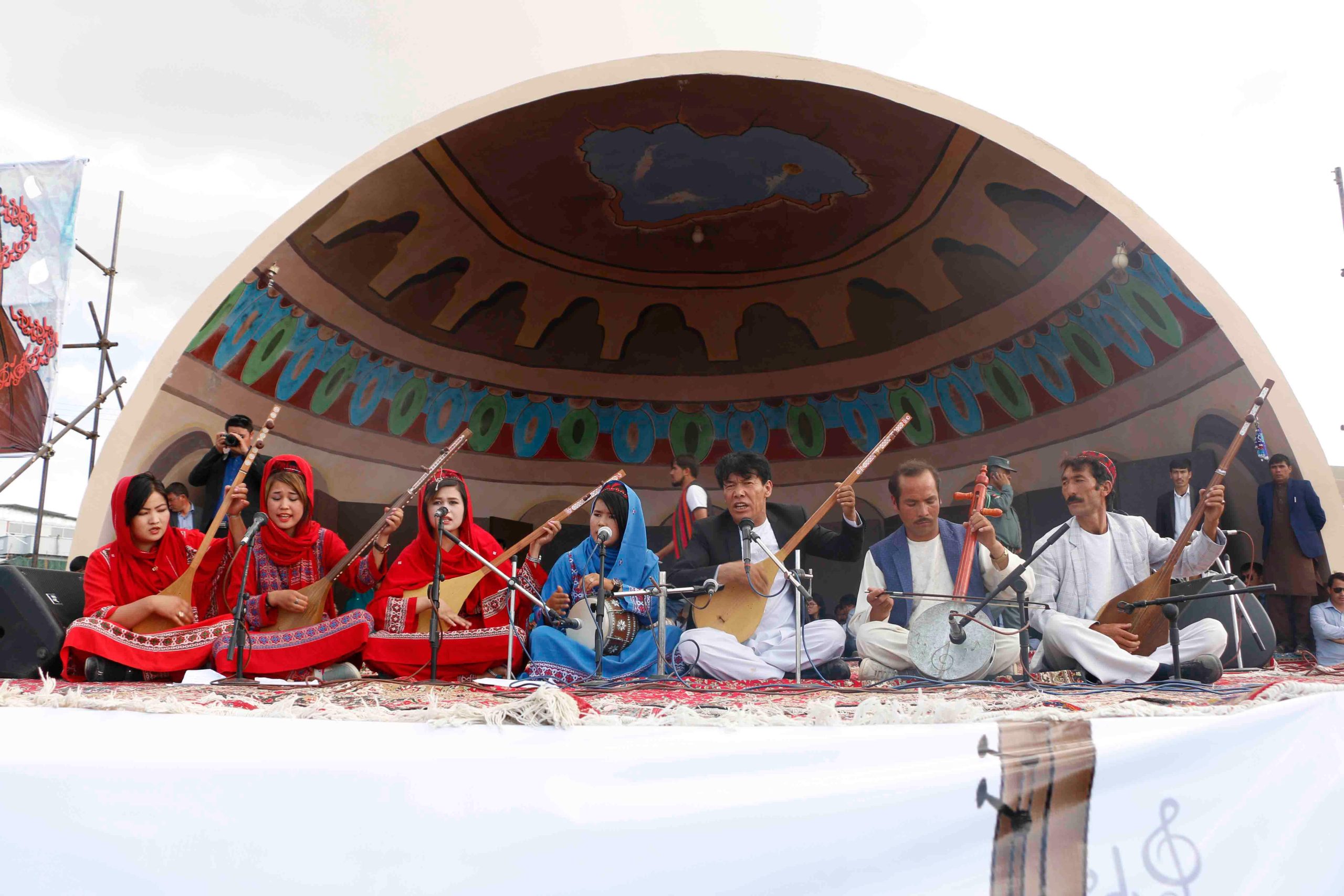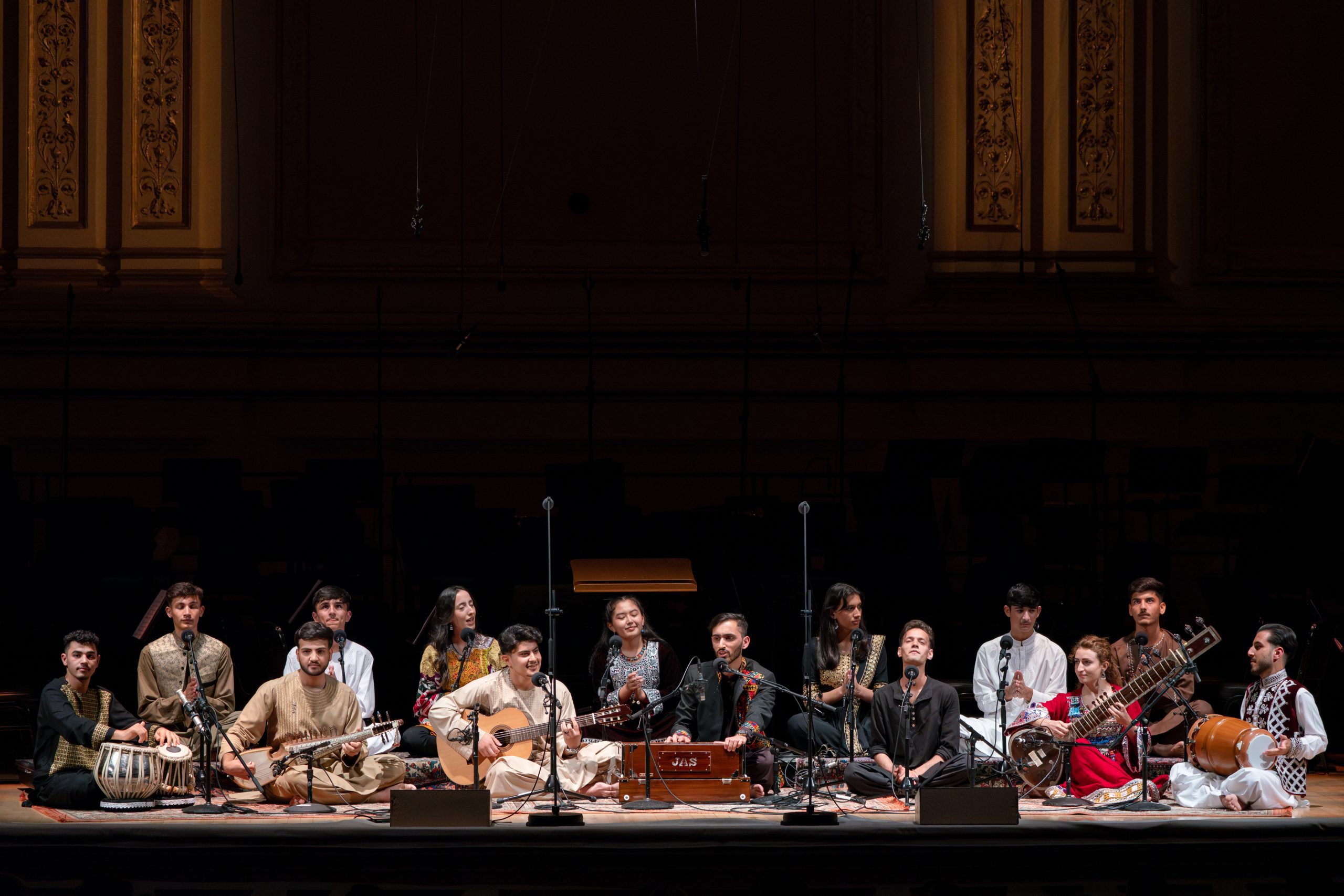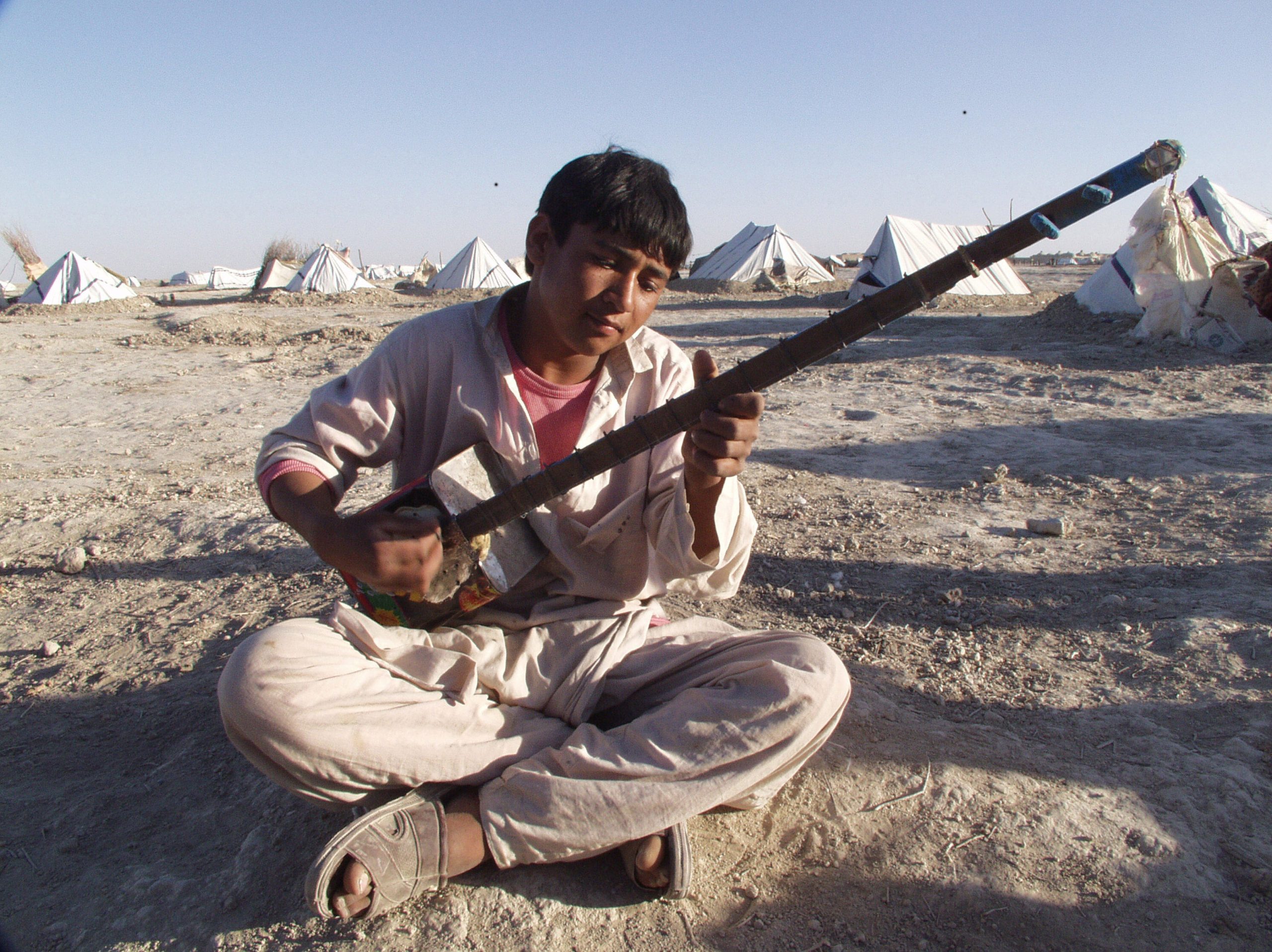This article first appeared in Volume 53, Issue 4 of our print edition of Index on Censorship, titled Unsung Heroes: How musicians are raising their voices against oppression. Read more about the issue here. The issue was published on 12 December 2024.
When the Taliban seized power in Kabul in August 2021, they soon began searching people’s homes for items they deemed to be immoral. Waheedullah Saghar, the head of the music department at Kabul University, had to destroy all of his musical instruments before they were found. Among his collection were special items he’d bought during his time in India, such as a tanpura – a traditional folk stringed instrument.
“It was too risky to keep instruments at home,” he told Index. “Many of my colleagues also felt forced to destroy their instruments, and we disposed of the broken pieces in the garbage to protect ourselves.”
He was denied access to his university and received an official notice from the Taliban that all musical activities in Afghanistan would be prohibited in future.
“It’s very strange, because one day we were honourable, respectable people of our city,” he said. “Then just one day later we became victims and as if we should be punished, because we were musicians. It was very painful and very difficult.”
Saghar and his colleagues were granted asylum in Germany in 2021, and he is currently based in New York on a year-long placement, where he is keeping the culture of his home country alive by teaching university students about Afghan and Indian classical music.
“We had to find a solution for our situation,” he said. “Staying in Afghanistan in that critical moment was not an option because our lives were in danger.”
His story is similar to those of many musicians who have been either forced to leave or forced to abandon their livelihoods. Musicians in the country live in fear of discrimination, humiliation, torture, imprisonment, sexual violence in the case of women and even death. According to the Associated Press, the family of folk singer Fawad Andarabi accused the Taliban of executing him near his home in a mountain province north of Kabul in 2021.
Since their return in 2021, the Taliban have waged a war on music, claiming that it causes “moral corruption”. This approach mirrors their reign between 1996 and 2001, when music was also strictly prohibited. According to figures from its own Ministry for the Propagation of Virtue and the Prevention of Vice, the group has destroyed more than 21,000 musical instruments over the past year, including traditional items such as tabla drums and rubabs, a type of lute which is Afghanistan’s national instrument.
After their takeover of Kabul, the country’s public radio station, Radio Afghanistan, was swiftly rebranded Voice of Sharia, and music was removed from radio and TV stations, replaced with religious chanting.

Afghans play the dambora at a music festival in Bamyan province in 2017. Photo by Xinhua / Alamy
The Taliban’s use of chanting shows that there is hypocrisy in their extremism, Saghar says. They are sung without instruments, to inspire patriotism and instil their ideology.
“The Taliban don’t seem to understand what music truly represents or its role in society,” he said. “They claim that music is haram (“forbidden”) in Islam, without considering its broader meaning and significance. Music is an inseparable part of human life and is even integrated into aspects of Islamic practice.
“For example, the Quran is recited using musical scales, known as maqams in Arabic, and the Taliban themselves sing taranas – songs composed in Afghan musical scales. However, they overlook these nuances, and they are mainly opposed to musical instruments.”
Since the Taliban’s return, the move towards cultural censorship has gradually worsened, said Ahmad Sarmast, who is the founder of the Afghanistan National Institute of Music, an exiled music school now based in Portugal.
Three years after their takeover, the Taliban announced their “vice and virtue laws”, which have been internationally condemned by human rights groups and the UN. These put in writing the banning of music, said Sarmast, as well as the restriction of women singing or reading aloud in public. This is in addition to the chilling stipulation that women must not speak or show their faces outside their homes.
Cultural bans have since been extended to the wider creative industries, such as filming and photography. The new morality laws prescribe that news media cannot publish images of living things, and TV stations across the country are gradually being closed and converted to radio stations as a result, according to a report from the London-based news site Afghanistan International.
“It’s not just the ban of music or the destruction of musical instruments – it’s a direct attack on the cultural heritage of Afghanistan, and on the freedom of expression of the Afghan people,” said Sarmast.
His orchestral school, which teaches classical Afghan as well as classical and modern Western music, has been “on the Taliban’s hit list” for a decade, he told Index, and endured suicide bombing attempts and targeted attacks even before the group came back into power. Despite the international “whitewashing” of Taliban 2.0, he knew the organisation was “not capable of being changed”.
“We knew that when the Taliban came, our days would be over,” he said.
In a similar way to Saghar’s university department, his music school was “treated like a military barracks” when the Taliban returned. The campus was vandalised, students and faculty were denied entry, property was removed and its bank account was seized.
“Afghanistan was suddenly turned into a silenced nation,” said Sarmast.
Musicians who have been granted asylum tend to be those with a public profile and strong international connections, or those from wealthier backgrounds. Others sold everything they could and took up low-paid jobs, such as selling street food, to survive, Sarmast explained.
One female violinist spoke to Index anonymously about her experiences. She was previously a music teacher but now cannot get a job because she doesn’t have legitimate qualifications beyond her musical education, which is now worthless.
She is currently in hiding and has had to move house several times to avoid being found out as a former musician. She has applied for asylum in Europe, but hasn’t yet been accepted.
“We don’t have a peaceful life. We have to be hidden,” she said. “No one should know that we used to make music. If the Taliban find out, they will kill us.”
Life is particularly treacherous for female musicians. This didn’t start when the Taliban came back into power, but it has worsened, says London-based Afghan singer Elaha Soroor. She told Index that gender discrimination from the fallout from the Taliban’s previous reign made her situation untenable.
“There was a patriarchy, this system, this way of looking at women’s lives – it’s always been there,” she said. “But the Taliban is the worst form of patriarchy. The foundation was there, but people were changing slowly [after their earlier fall], and things were becoming more normal.”

Singer-songwriter Elaha Soroor left Afghanistan in 2010, and now lives in the UK. Photo by Elaha Soroor. Photo by Elaha Soroor
Soroor, who is of the persecuted Hazara ethnic group, was one of the first female musicians to perform in public after the fall of the Taliban in 2000, and appeared on the reality TV show Afghan Star in 2008. She faced death threats, harassment and violence because of her public profile, including from male family members. When an anonymous person uploaded a fake pornographic video of her to YouTube, the violence escalated, and she fled Afghanistan in 2010, seeking asylum in the UK in 2012.
Whilst society was still restrictive, there was more freedom for musical expression then, she said. Bands played at weddings, “music travellers” would walk around the streets with percussion instruments and people loved listening to music.
“You’d go to a taxi [and] everybody’s listening to music at a loud volume,” she said. “It was mainly Afghan pop music from the ’60s and ’70s, new music, Bollywood, Turkish, Arabic and Hindustani.”
She believes that the Taliban’s draconian laws are a way of limiting free thought.
“Musicians, artists, they open up new doors and new ideas. They have this power of entering someone’s subconscious. The Taliban are scared of the power of art, because it can spark new ideas in someone’s mind, and change their way of thinking,” she said.
Now that she’s out of the country, she believes it is her role as an exiled musician to help keep Afghan music alive. In October, she released a new female liberation song titled Naan, Kar, Azadi! (Bread, Work, Freedom!), which she sings in her mother language, Farsi. It features other exiled female Afghans who have spoken out against the Taliban’s oppressive rule, including rapper Sonita Alizadeh. On Instagram, Soroor dedicated the song to “our sisters in Afghanistan as they continue to fight for their rights… in the face of adversity”.
“I feel like the artists who are outside Afghanistan… should be more proactive, create more and stay connected with the story of Afghanistan,” Soroor said. “So at least, if people cannot produce art inside, we should continue producing it outside and export it there [through the internet]. So we keep the flame alive.”
Cayenna Ponchione-Bailey, who produced Soroor’s latest track, is director of performance at Oxford University’s St Catherine’s College, and an academic specialising in orchestral music in Afghanistan. She is working with exiled Afghan musicians to write the first book on orchestral music in the country.
She says that while there is an “absolute ban on music”, its enforcement is likely “uneven”. It’s possible that, in less policed areas, people still listen to music and “engage in their traditional music practices” at home, but professional music-making has certainly been brought to a standstill, which will have long-term impacts on the country’s musical heritage.
“You can’t work – there are no weddings, no parties,” she told Index. “So you have people’s musical knowledge and skill-sets that are probably atrophying. Then they’re becoming impoverished because they don’t have alternative work opportunities.” This has lowered the “social status” of musicians, she said, to historically what it would have been when it was intertwined with “vices” such as alcohol and drug use.
She is particularly concerned about traditional musicians, who she says have been overlooked by European asylum schemes. These have typically given preference to schools making orchestral music – or “Western” music – as they have stronger diplomatic ties with international orchestras, and their students are often better educated with stronger English language skills.
Music made using instruments such as the rubab, the tanbur and the dholak could be lost. She is calling for Germany, which has already established asylum schemes, to set up an Institute of Afghanistan Traditional Music, which could become an international hub for the art form and could help to “potentially get more people out of the country to teach”.

The Afghanistan National Institute of Music is now based in Portugal. Photo by Jennifer Taylor
Artists who made “modern” music, such as rock and pop, also remain stranded in the country. One singer-songwriter and guitar player spoke to Index anonymously. He taught himself the guitar after practising on his father’s dotar. His income stream from music has completely stopped. While he sees music “as a way for great social and cultural change, rather than for money making”, that too has been curtailed.
Having a public profile as a musician is now “almost equal to signing my death certificate”, he said. He has endured threats and physical attacks, and the situation has severely impacted his mental health. “I spend every day with worry and every night with fear, and sometimes I jump from sleep,” he said. “The mental problems that have been created for me are sometimes unbearable. I am always worried about being arrested, killed or tortured.”
Prior to 2021, he would perform for events like International Women’s Day. He hopes that one day girls and women can “study freely and play music, and not be deprived of their basic rights”.
“The absence of music and art has caused freedom of expression to disappear, creativity in culture and art to decline, and national and cultural identity to be weakened,” he said.
Those who have fled Afghanistan have been torn away from their home country, but are still beating the drum for progress and equality. Sarmast, of the Afghanistan National Institute of Music, says that the international music community must work together to raise awareness of the cultural destruction and “gender apartheid” that is happening, and put pressure on the Taliban to restore human rights, of which he believes access to music is one.
As Afghan musicians live in the shadows, those in exile continue to raise awareness of their plight. But there is a real risk that the rich musical heritage of the country will be forever silenced if the world doesn’t continue to campaign for its right to exist.






